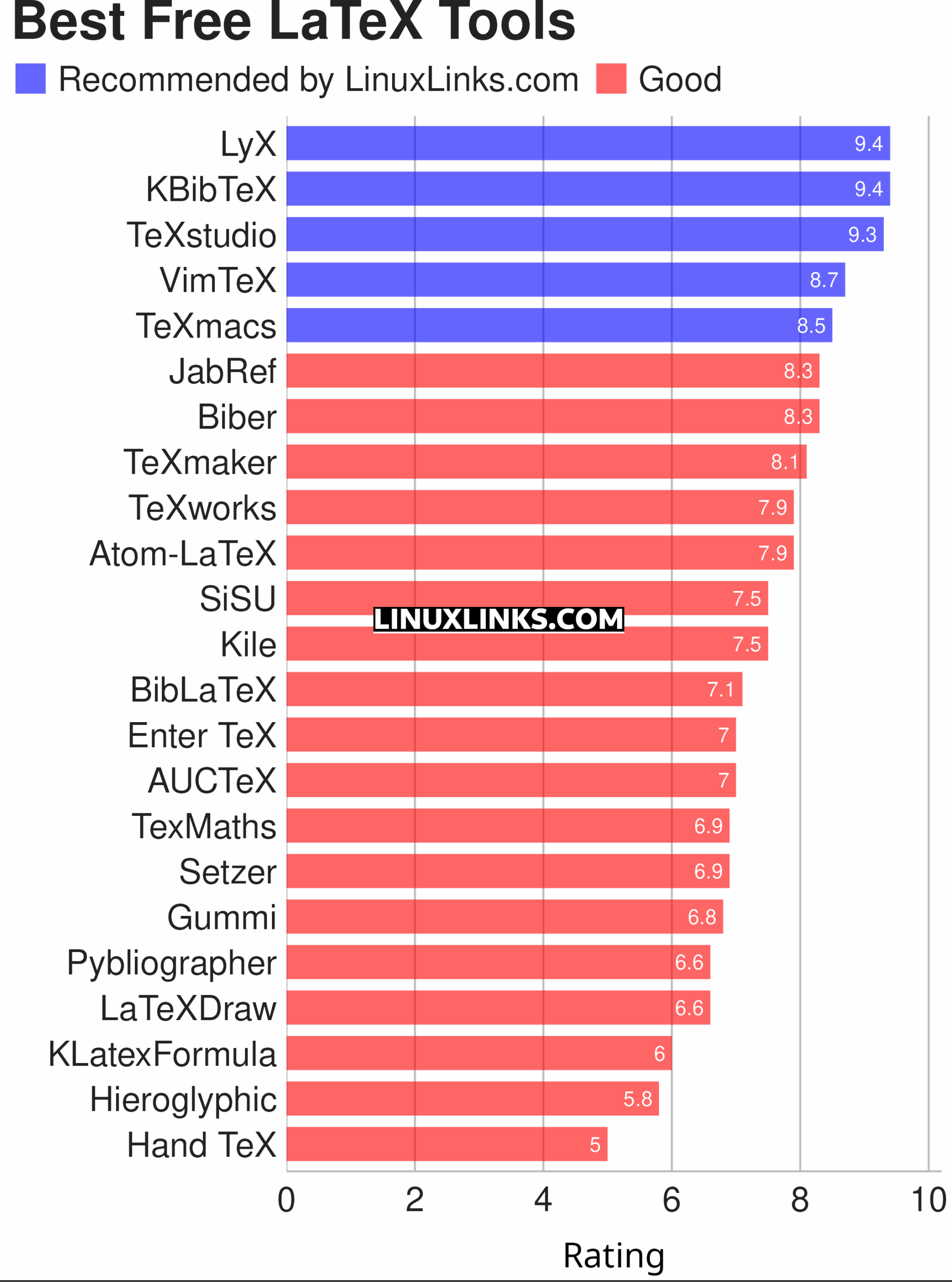LaTeX is a document preparation system and document markup language for high-quality typesetting. The system was originally developed by Leslie Lamport in the early 1980s. LaTeX is based on Donald E. Knuth’s TeX typesetting language. Lamport says that LaTeX “represents a balance between functionality and ease of use”.
LaTeX is often used for technical or scientific documentation, particularly because it generates well formatted papers with beautifully crafted formulae, but the system can be used for any form of publishing. It employs beautifully crafted typesetting algorithms. Academic journals will often accept submission in this format.
Using the LaTeX system leads the author to concentrate on the structure of the document rather than its appearance. The author therefore focuses on what he/she wants to say, instead of fretting over page borders, font attributes, or formatting. Moreover, the author will be guided in the organization, structure, and flow within the document.
The recommended LaTeX distribution is the one that comes with TeX Live, the replacement of its counterpart teTeX. This is a general TeX distribution that is actively maintained by the TeX Users Group.
Almost any editor or wordprocessor can be used to write LaTeX documents, but many users of the system prefer to use software specially designed for LaTeX.
The purpose of this article is to identify our favorite open source software that works in conjunction with the LaTeX system. Featured in this article include excellent LaTeX editors, bibliography tools and more.
To provide an insight into the quality of software that is available, we have compiled 22 high quality Linux tools. Hopefully, there will be something of interest for anyone who wants to make their writing look great.
We make the following recommendations, captured in a legendary LinuxLinks-style chart. Only free and open source software is eligible for inclusion here.

Let’s explore the 23 tools at hand. For each title we have compiled its own portal page, providing a screenshot of the software in action, a full description with an in-depth analysis of its features, together with links to relevant resources.
| LaTeX Tools | |
|---|---|
| LyX | The power and flexibility of TeX/LaTeX with an intuitive graphical interface |
| KBibTeX | Reference management software primarily for BibTeX |
| TeXstudio | Fully featured open source LaTeX editor |
| VimTeX | Vim and Neovim filetype and syntax plugin |
| TeXmacs | WYSIWYG mathematical text editor using TeX fonts |
| JabRef | Graphical frontend to manage BibTeX databases |
| Biber | BibTeX replacement for users of BibLaTeX |
| TeXmaker | Integrates many different tools |
| TeXworks | Simple front-end modeled on TeXShop |
| Atom-LaTeX | Typesetting with GitHub's Atom text editor |
| SiSU | Documents - structuring, publishing in multiple formats and search |
| Kile | KDE Integrated LaTeX Environment |
| BibLaTex | Programmable bibliographies and citations |
| Enter TeX | Integrated LaTeX Environment for the GNOME desktop |
| AUCTeX | Environment for editing LaTeX, ConTeXt, docTeX, Texinfo, and TeX files |
| TexMaths | LaTeX equation editor for LibreOffice |
| Setzer | Full-featured LaTeX editor |
| Gummi | Simple LaTeX editor |
| Pybliographer | Tool for managing bibliographic databases |
| LaTeXDraw | Graphical drawing editor for LaTeX |
| KLatexFormula | Useful utility for creating images from LaTeX equations |
| Hieroglyphic | Find LaTeX symbols |
| Hand TeX | Handwritten LaTeX symbol classifier |
This article has been revamped in line with our recent announcement.
 Read our complete collection of recommended free and open source software. Our curated compilation covers all categories of software. Read our complete collection of recommended free and open source software. Our curated compilation covers all categories of software. Spotted a useful open source Linux program not covered on our site? Please let us know by completing this form. The software collection forms part of our series of informative articles for Linux enthusiasts. There are hundreds of in-depth reviews, open source alternatives to proprietary software from large corporations like Google, Microsoft, Apple, Adobe, IBM, Cisco, Oracle, and Autodesk. There are also fun things to try, hardware, free programming books and tutorials, and much more. |

LyX is superb. I use it daily as it’s the best way to quickly create math content with a fully integrated equation editor.
LyX offers professional typesetting without the complexity of using LaTeX manually. LyX is definitely worth downloading.
The link to KBibTeX, another brilliant LaTeX-Tool, points to GNOME LaTeX. Is that intended?
Thanks Julian for spotting an incorrect link. We have corrected our mistake. Thanks again!